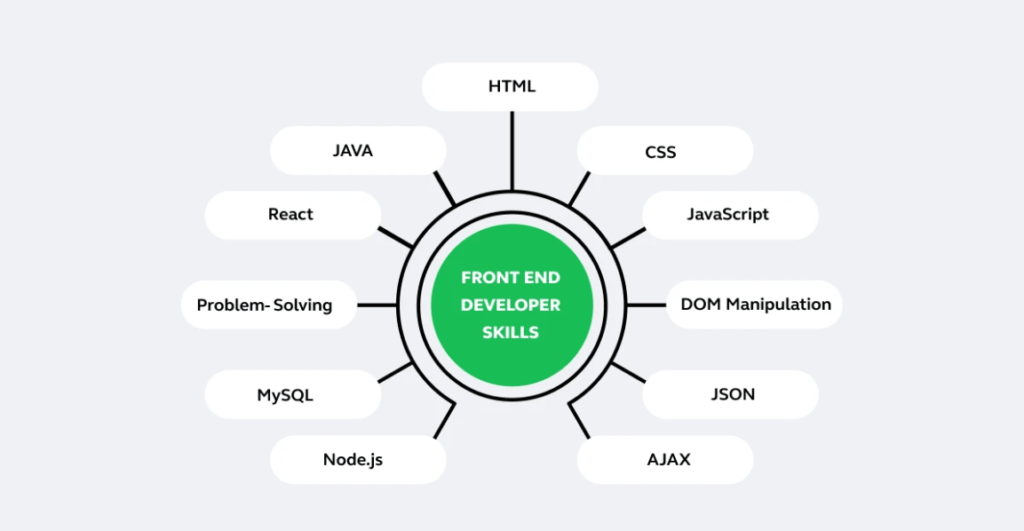Frontend development is a dynamic and ever-evolving field. With the rapid pace of technology, staying updated with the latest trends and tools can feel overwhelming. If you’re passionate about creating stunning user interfaces and seamless web experiences, you’re in the right place.
Whether you’re just starting out or looking to sharpen your skills, having access to quality resources is crucial for every frontend developer. From coding bootcamps to online courses, there’s an abundance of options available that cater to different learning styles and preferences.
In this post, we’ll explore the top 10 must-have resources for frontend developers that will elevate your skills and keep you ahead of the curve in this competitive industry. Let’s dive into these invaluable tools designed specifically for those who want to enhance their craft!
Essential skills for frontend developers
Frontend developers need a mix of technical and soft skills. Proficiency in HTML, CSS, and JavaScript is fundamental. These languages form the backbone of web development, allowing you to create stunning user interfaces.

Understanding frameworks like React or Angular can significantly enhance your efficiency. They streamline the process and add functionality without reinventing the wheel.
Responsive design is another crucial skill. Today’s users access websites on various devices; ensuring that your designs adapt seamlessly is essential for a positive user experience.
Additionally, knowledge of version control systems such as Git allows for better collaboration among team members. It keeps track of changes and simplifies project management.
Soft skills shouldn’t be overlooked either. Effective communication fosters teamwork while problem-solving abilities help tackle challenges creatively in real-time scenarios. Balancing these diverse skills sets frontend developers apart in today’s competitive landscape.
Online Courses and Tutorials
Online courses and tutorials are game-changers for frontend developers. They offer flexibility that traditional education often lacks. You can learn at your own pace, fitting lessons around your schedule.
Platforms like Udemy, Coursera, and freeCodeCamp provide a vast array of topics. Whether it’s HTML basics or advanced JavaScript techniques, there’s something for everyone. Many courses also include hands-on projects to solidify your understanding.
YouTube is another treasure trove of information. Numerous channels focus on web development tutorials, offering insights from industry experts without any cost.
For those seeking structured learning paths, platforms such as Codecademy and Pluralsight are ideal. They guide you through the essential skills needed in today’s job market while providing interactive coding challenges along the way.
With so many options available, aspiring frontend developers can find resources tailored to their specific needs and skill levels with ease.
Coding Bootcamps
Coding bootcamps have emerged as a popular way for aspiring frontend developers to gain essential skills quickly. These intensive programs typically last from several weeks to a few months, focusing on hands-on learning.
Participants dive straight into coding projects, which helps build a solid portfolio. Many bootcamps cover the latest technologies and frameworks that employers seek today.
Networking is another significant advantage. Bootcamp cohorts often foster strong connections among classmates and instructors. This can lead to job opportunities down the line.
Additionally, some bootcamps offer career support services like resume workshops and interview prep. This guidance can be invaluable in navigating the tech job market effectively.
With flexible options available—online or in-person—there’s likely something that fits your schedule and learning style perfectly.
Community and Networking Opportunities
Building connections is vital for frontend developers. Engaging with a community can open doors to new opportunities and insights.
Online platforms like GitHub and Stack Overflow allow developers to showcase their work while seeking help from peers. These interactions can lead to mentorships or collaborations on projects, enriching your skill set.
Local meetups and tech events are also invaluable. They provide a chance to network face-to-face with other professionals in the field. Sharing experiences over coffee often leads to unexpected learning moments.
Don’t overlook social media groups focused on frontend development. Platforms such as Twitter or LinkedIn host vibrant communities where trends emerge, resources are shared, and discussions flourish around best practices.
Joining forums dedicated to specific technologies enables deeper dives into niche areas of interest. These spaces foster growth by connecting you with others who share your passion for coding excellence.
Podcasts and Webinars
Podcasts and webinars are fantastic resources for frontend developers looking to expand their knowledge on the go. They offer a flexible way to learn while commuting or multitasking.
Many podcasts feature interviews with industry leaders, providing insights into emerging trends. Listening to experienced developers share their journeys can be both inspiring and educational.
Webinars take it a step further by offering live interaction. Attendees can ask questions in real-time, making these sessions highly engaging. Many platforms host regular webinars focusing on specific technologies or frameworks that every frontend developer should know.
Exploring these mediums not only enhances skills but also keeps you updated on best practices. Plus, they create opportunities to connect with other professionals who share your interests in web development tools and techniques. Whether you’re a beginner or seasoned coder, there’s always something new waiting for you in this auditory space.
Developer Tools and Software
Developer tools and software are the backbone of every frontend developer’s workflow. These resources streamline coding processes, enhance productivity, and improve the overall development experience.
One popular tool is Visual Studio Code. This powerful code editor offers extensions that cater to various frameworks and technologies. Its intuitive interface makes it easy for developers to write, debug, and collaborate on projects effectively.
Another essential resource is Chrome DevTools. It allows developers to inspect elements in real-time, analyze performance issues, and fine-tune their applications right from the browser.
Version control systems like Git are crucial as well. They help manage changes in code efficiently while enabling smooth collaboration among team members.
To boost design capabilities, Figma stands out with its user-friendly interface for creating prototypes. Combining these tools not only enhances individual productivity but also fosters teamwork within a development environment.
Books and Blogs
Books and blogs are invaluable resources for frontend developers. They provide deep insights into best practices, new technologies, and real-world applications of coding.
Reading books like “JavaScript: The Good Parts” by Douglas Crockford or “Eloquent JavaScript” can sharpen your programming skills. These texts offer comprehensive knowledge that goes beyond basic tutorials.
Blogs also shine in the ever-evolving tech landscape. Websites such as CSS-Tricks and Smashing Magazine deliver fresh content regularly. They cover everything from design trends to advanced coding techniques.
Engaging with both media types helps you stay updated on industry developments. Developers often share their experiences through personal blogs, offering practical advice that textbooks might overlook.
Diving into this wealth of information fosters a mindset of continuous learning—essential for any successful frontend developer aiming to excel in their field.
Conferences and Events
Attending conferences and events is a game changer for frontend developers. These gatherings present an opportunity to learn from industry leaders, discover emerging trends, and connect with like-minded professionals.
Networking happens naturally in these environments. You can exchange ideas, collaborate on projects, or even find mentors who can guide your career path.
Workshops at these events often dive deep into specific technologies or techniques. Whether it’s mastering React or exploring the latest CSS frameworks, you’ll walk away with new skills to implement right away.
Many conferences also feature hackathons that challenge your coding abilities under pressure. It’s a fun way to test your knowledge while working alongside other talented developers.
Don’t underestimate the power of in-person interactions either. Engaging discussions during breaks can lead to valuable partnerships and friendships within the developer community.
Conclusion
Frontend development is an ever-evolving field that requires continuous learning and adaptation. The resources listed are invaluable for both newcomers and seasoned developers alike. They provide opportunities to sharpen skills, connect with like-minded individuals, and stay updated on industry trends.
By utilizing online courses, engaging in bootcamps, participating in community events, or diving into podcasts and webinars, you can greatly enhance your skill set. Developer tools streamline workflows while books and blogs offer deeper insights into best practices and innovative techniques.
Attending conferences allows you to network with professionals who share your passion for frontend development. As the technology landscape continues to shift, having a mix of these resources at your fingertips will keep you ahead of the curve.
Investing time in these areas not only enriches your knowledge but also nurtures growth within the vibrant world of frontend development. Embrace these resources today to elevate your career journey tomorrow.















